‘Democracy Can Die’: Reagan Appointee Former Justice Kennedy Warns Freedom at Risk from Threats to Judges
Former Supreme Court Justice Anthony Kennedy offered a dire warning for the United States on Thursday that the “hostile, fractious discourse” and threats to judges were putting democracy and freedom at risk.
Kennedy made the remarks at a forum held by Speak Up for Justice titled “Global Threats to the Justice System: A Warning to America” that focused on threats to the rule of law. He was joined other current and former judges from the U.S., along with judges from other countries that have experienced authoritarian crackdown and other assaults on the rule of law.
First appointed to the federal bench by President Gerald Ford, Kennedy was nominated to the Supreme Court by President Ronald Reagan and unanimously confirmed by the Senate in 1988. He retired in 2018 and was replaced by his former law clerk, Brett Kavanaugh.
“Many in the rest of the world look to the United States to see what democracy is, to see what democracy ought to be,” said Kennedy. “And if they see a hostile, fractious discourse, if they see a discourse that uses identity politics rather than to talk about issues, democracy is at risk. Freedom is at risk.”
“Aristotle said that freedom can die, and he was right,” Kennedy continued. “Aristotle said that democracy can die. He is right. Democracy doesn’t live on autopilot. You don’t take a DNA test to see if you believe in freedom. Freedom and democracy are taught, and teaching is a conscious act, and that’s what our judges do.”
Kennedy did not mention Trump by name, but his cautionary words for the country at this moment were framed in a way to reasonably be interpreted as responding to the current administration.
For years, Trump has frequently inveighed against judges who rule against him, throughout his first presidential term, especially during the various criminal and civil legal matters that followed, and now in the first few months of his second term. Both the president and members of his administration have vociferously criticized judges that have issued injunctions or otherwise thwarted the White House’s sweeping agenda on tariffs, immigration, and numerous other matters already in litigation.
In March, Trump furiously reacted to U.S. District Court Judge James Boasberg issuing an order temporarily halting deportations under the Alien Enemies Act of 1798 by bashing the judge as a “radical left lunatic” and calling for him to be impeached. This drew a rare rebuke from Chief Justice John Roberts.
Last month, current Supreme Court Justice Ketanji Brown Jackson also criticized the “threats and harassment” directed at judges as “attacks” that “seem designed to intimidate those of us who serve in this critical capacity,” and function as “attacks on our democracy, on our system of government,” and “ultimately risk undermining our Constitution and the rule of law.”
Trump fired off another social media post complaining about judges just a few hours later.
“Judges must have protection for themselves and their families,” said Kennedy. “Our families are often included in threats.”
During his speech, Kennedy urged the American public to resist the temptation of indifference and to take advantage of the current “opportunity” to “make democracy stronger:
One of the great threats to judicial independence and authority is not hostility, but indifference…You can blame the press, in part, for not focusing on these things, but the public must do so as well. We can’t be indifferent now…
The purpose of this nation is to preserve freedom and to enhance freedom—for ourselves and for generations to come. And that is what judges do, day in and day out. That’s why this time, when we’re celebrating peace, it’s so important for us to remember that this is the opportunity. Peace is what gives us the opportunity to make democracy stronger, to make freedom more attainable, to make freedom greater—for ourselves and the rest of the world. We must always say no to tyranny and yes to truth.
He also spoke about the destructive influence of partisan politics:
Judges decide issues which have political consequences, but they don’t decide in a political way. We have to honor the fact that judicial independence does not mean judges are put on the bench so they can do as they like—they’re put on the bench so they can do as they must…
One of my concerns is that partisanship plays too big a role in confirmation. Of course, “Republican” and “Democrat” have meaning, but Congress must focus more on temperament, learning, background, experience—not just politics. And again, to remind the public that judges should decide political issues, but not in a political way.
U.S. District Court Judge Esther Salas, whose son was murdered and husband wounded in a targeted retaliation by an angry litigant at her home in 2020, also addressed the forum.
Since the attack on her family, Salas, an Obama appointee, has been an outspoken advocate for judicial safety. Like Kennedy, she did not mention Trump’s name in her remarks about threats against judges but did make more express references that connected his attacking comments to those uttered by authoritarian leaders as they sought to undermine the judiciary — a “spreading of misinformation from the top down.”
Salas said that just this year, the U.S. Marshals Service has recorded more than 400 threats against judges. “We’re going to break records — and not in a good way,” she said.
According to press release provided to Mediaite, other speakers at the forum included:
Former Judge Eleazar Javier Saldivia (Venezuela) – One of the few judges to hold Venezuelan police accountable under Hugo Chávez, Saldivia faced harassment by pro-government militias, was stripped of his judicial protections, and forced into exile. He now warns that Venezuela’s democratic collapse began not with tanks or protests, but with the slow dismantling of judicial independence.
Judge Dorota Zabludowska (Poland) – Featured in the acclaimed documentary A Thousand Robes, Zabludowska became a symbol of resistance as Poland’s ruling party launched a sweeping purge of the judiciary. She endured surveillance, smear campaigns, and political pressure for defending the rule of law. She sees chilling parallels in today’s global trends, including in the U.S.
Justice Richard Goldstone (South Africa) – Former Chief Prosecutor of the UN Tribunals for Rwanda and Yugoslavia, leader of South Africa’s Goldstone Commission, and architect of the country’s post-apartheid Constitutional Court. A global authority on accountability and rebuilding trust in justice systems.
Karen C. Burgess (United States): A past President of the International Academy of Trial Lawyers and a nationally recognized trial attorney. Burgess is a leading voice for legal ethics, judicial independence, and civic responsibility in the U.S. justice system.
Judge Karoline Mehalchick (U.S.) – Chief Magistrate Judge, Middle District of Pennsylvania, known for promoting fairness and independence.
Judge Beth Bloom (U.S.) – U.S. District Judge noted for rulings on civil rights and constitutional protections.
Attorney Paul Kiesel – Forum host, legal analyst, and founder of Speak Up for Justice.
Watch the video above, via Speak Up for Justice on YouTube.
New: The Mediaite One-Sheet "Newsletter of Newsletters"
Your daily summary and analysis of what the many, many media newsletters are saying and reporting. Subscribe now!
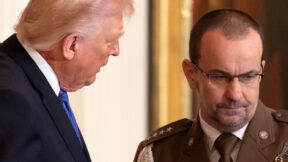
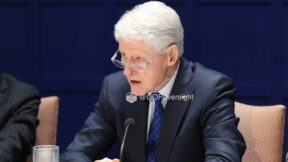
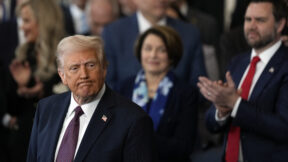
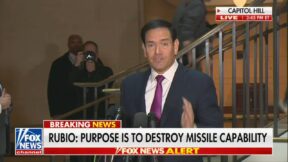
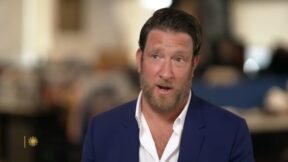

Comments
↓ Scroll down for comments ↓